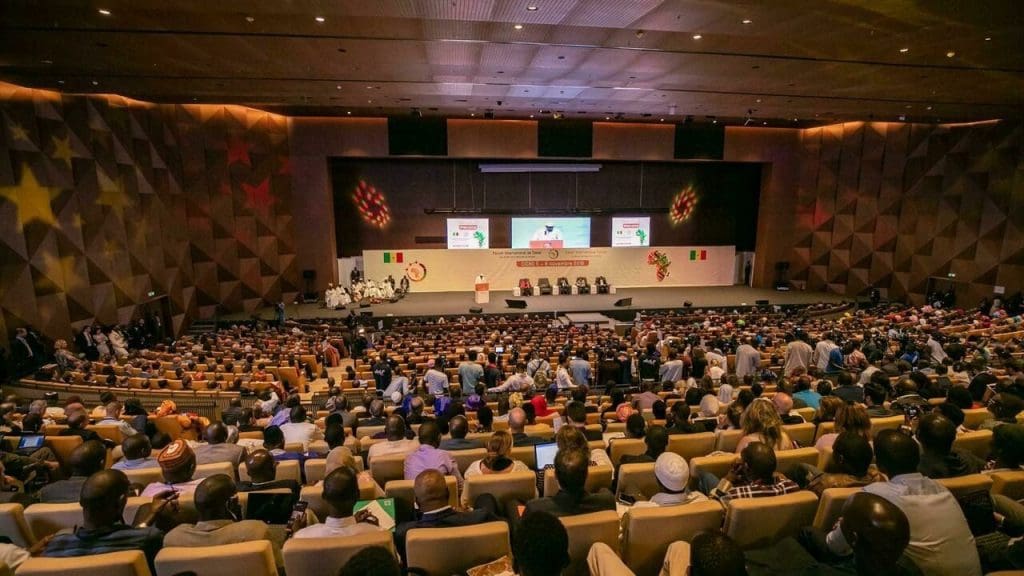As in previous years, the discussions during this 7th edition of the Dakar Forum will be largely dominated by security issues, particularly those related to jihadist groups in Africa.
At the time of the first edition, there was a fear that the discussions would amount to “shooting in the dark), as Africa has often been the scene of such events. Seven years later, the Dakar International Peace Forum, simply referred to as “Dakar Forum”, has become the annual meeting place for those interested in peace and war matters and their consequences on business on the continent. The 7th edition–which in fact is the 6th because of the cancellation of the 2020 edition due to the Covid pandemic19–, which takes place on December 6-7, 2021, will gather hundreds of guests from all walks of life, with various motivations.
As in previous editions, some Heads of State, especially from Africa, such as South Africa4S Cyril Ramaphosa, Guinea Bissau’s Umaro Sissoco Embaló or Mohamed Bazoum of Niger, are invited as guests of honor. We will also meet ministers and senior officials in charge of defense and security, diplomatic professionals, military officers with shoulders and chest full of medals, former senior officials of the armed forces who have become businessmen in private security or economic espionage, academics, journalists and think-tank leaders specializing or interested in issues related to crises and conflicts, not to mention business researchers of all kinds including the inevitable arms dealers who love such gatherings.
The theme of this year’s Forum: “The challenges of stability and emergence in Africa in a post-Covid 19 world,” should not be misleading. As in previous years, the discussions will largely focus on security issues, particularly those related to jihadist groups in Africa, which after conquering almost all the countries of the Sahel now seem to be advancing elsewhere on the continent, as seen in some countries of the Gulf of Guinea, where Cote d’Ivoire, Togo and Benin, among other countries, are increasingly targeted.
Since a first particularly deadly attack in March 2016 against a hotel in the seaside resort of Grand-Bassam, near Abidjan, the former has been hit several times by operations attributed to Islamists, mainly in the Kafolo region, in the north of the country near the border with Burkina-Faso. The latest was on Saturday, June 12, 2021, when at around 7:00 p.m., an army reconnaissance patrol was ambushed on the Tehini-Togolokaye road near Burkina Faso. Two soldiers and a gendarme were killed. This was the second attack in less than a week after the one in Tougbo, also not far from the Burkina Faso border; it was the fourth in two months in the region. The latest attacks in northern Cote d’Ivoire– again near the Burkina Faso border– date back to March 29, when two army positions in Kafolo and Kolobougou were targeted by gunmen, leaving six dead, three soldiers and three assailants.
In Togo, the threat is also evident in an assault on an army position, also attributed to Islamists, on the night of November 9-10 in Kpendjal, in the northern town of Sanloaga, not far from Burkina Faso.
In Benin, the army was also targeted. One of its positions, located in the Atacora region, was targeted by “jihadists” during the night of December 1 to 2. In addition to several wounded soldiers, two soldiers and one assailant were killed. The previous day, a skirmish occurred in the neighboring department of Alibori, also on the border with Burkina. That time, the targeted army patrol which was near the Mekrou River, escaped from an attack attributed to jihadists.
In Dakar, the official agenda distributed to participants hardly mentions a specific moment dedicated to the situation in the Gulf of Guinea, which experts are now unanimous in fearing will sooner or later become a major ground for the action of jihadist groups. But it is very difficult for the subject to be ignored during the debates.
Will we find a way to also mention those other burning issues, also absent from the official agenda, such as the results of the French intervention in the Sahel, which after eight years, is currently undergoing a profound change of strategic that does not suit everyone, the Malian government and army in particular.
The presence in the Senegalese capital of the French Minister of the Armed Forces, Florence Parly, whose country is Senegal’s main partner in the organization of the Dakar Forum, provides an ideal opportunity to raise the issue of the French presence in the Sahel
LoS/fss/abj.APA


